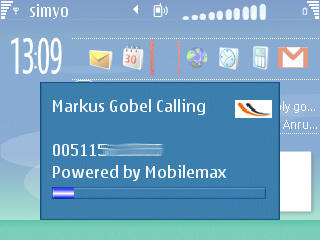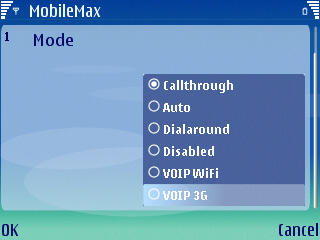I thought Truphone is based on the built-in SIP client? Then it would seem unlikely that Truphone applauds Nokia dropping the mobile VoIP stack from certain models.
My answer is the following:
Yes, Truphone until now works on top of the built-in SIP client. But the Truphone software develops more and more into a standalone application: with the inclusion of SMS, callthrough where no Wifi is available, presence information and so forth. They aren't afraid of building their own SIP app since it ties the customer even more to them. Therefore Gigaom wrote:
Truphone isn’t waiting around for Nokia to do something. A company spokesman told us: “From Truphone’s perspective Nokia has removed the VoIP client from all the N-Series phones for the planned future. We are putting in a replacement client functionality so that existing customers are not orphaned.”Don't forget that Truphone has a very high pricing for Wifi calls! Their software is convenient to install, but many other VoIP companies are three times cheaper. That's why they would be very happy to be your only mobile VoIP provider. Vyke already launched their own client, as you can read here, and Gizmo5's CEO Michael Robertson officially applauded Nokia's move in a FierceVoIP article.
The only losers are the cellphone users, since these 3rd party apps are much more difficult to use than the native SIP client. Read this insightful comment, posted at Phoneyboy's blog:
"I’m using VOIP on Nokia’s phone via my own asterisk server. How can Nokia expect me to develop my own Internet telephony application so that I can continue to use it? There are simply thousands of small users out there for whom this is beyond what they could do. This will leave them out in cold.We tinkerers who use Asterisk, Voxalot, Voipstunt, PBXes and Iptel.org are out of the game for the new Nseries devices. I am afraid that the Nokia E71 is the last cool device for a VoIP aficionado like me. Hopefully the Android devices will have more to give. Phoneboy calls us, who use 10 VoIP providers on our Nokia devices, a "minority". Nevertheless he "understands the frustration". Thank you!
And further comment. Any third party application will have hard time to match the comfort of integrated symbian UI, where normal and internet calls are integrated together and one push of a button decides which one to make. Just compare this with Fring whose UI is just terrible."
But still I think that he is wrong, or maybe just blue-eyed, when he says: "It sounds like the problem is only limited to these two handsets". The problem affects all Symbian Series 60 3rd generation Feature Pack 2 (S60 3.2)! This means: All new handsets from now on are affected. Nokia's VoIP isn't revolutionary disruptive anymore, but has changed to a big boys' only business.
P. D.: I have just found a new Gigaom article about the topic: "Nokia Clarifies Its Future N-Series VoIP Plans". Thanks for quoting my thoughts.

